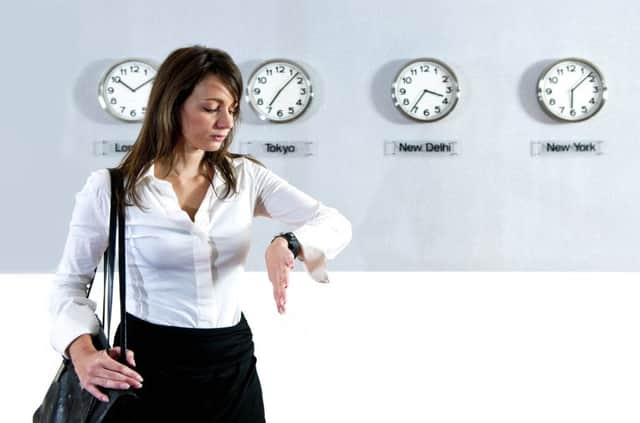Global time to stop for one ‘leap-second’


An extra sliver of time – a “leap-second” – is being added to the world’s clocks to adjust for the irregularity of the spinning Earth.
Before the invention of super-accurate atomic clocks, time was based on the Earth’s rotation, with one complete turn taking 24 hours.
Advertisement
Hide AdAdvertisement
Hide AdNow a plethora of time-sensitive systems, including computer programmes and financial markets, rely on the precise ticking of atomic clocks that measure the energy transitions of atoms.
The problem is that due to the Moon’s gravity, the Earth is slowing down, and not in a regular way. So every now and then, a leap second is added to allow astronomical time to catch up with atomic time. It is similar to the introduction of leap years to keep our calendars lined up with the Earth’s orbit around the Sun.
The latest pause – the 26th – will occur today at 23:59:59 co-ordinated universal time (UTC), which is an hour behind British Summer Time. UTC provides a worldwide standard free of time zones.
Computer programmers try to take account of leap seconds but many systems could be caught out, warns atomic clock expert Professor Judah Levine, from the US National Institute of Standards and Technology, in Boulder, Colorado.
He said: “It’s a major interruption mostly because there are a lot of systems that aren’t prepared to handle the leap second correctly.”
The last leap second in 2012 temporarily disrupted a number of websites, including Mozilla, Reddit, Gawker, LinkedIn, FourSquare and Yelp.
In Australia, more than 400 Quantas flights were delayed as staff were forced to switch to manual check-ins. Leap seconds were introduced in 1972, by which time atomic clocks and astronomical clocks were out of kilter by ten seconds.
That year, scientists had to add ten seconds to the world’s astronomical clocks in one go. The impact then in the pre-internet age was nothing like as great as it would have been today.
Advertisement
Hide AdAdvertisement
Hide AdExperts at the National Physical Laboratory (NPL) in Teddington, south-west London, will be responsible for adding the extra second to UK time.
Dr Peter Whibberley, senior research scientist with the time and frequency group at NPL, said: “There are consequences of tinkering with time. Because leap seconds are only introduced sporadically, it is difficult to implement them in computers and mistakes can cause systems to fail temporarily.
“However, we have always taken the Earth’s rotation as the ultimate reference for timekeeping, and astronomers and navigators still make use of it. We shouldn’t break the link without carefully weighing the consequences.”
Prof Levine advocates doing away with leap seconds.
“The price for that would be atomic time would slowly walk away from astronomical time,” he said, adding it would mean a difference of only a minute or two over 100 years.